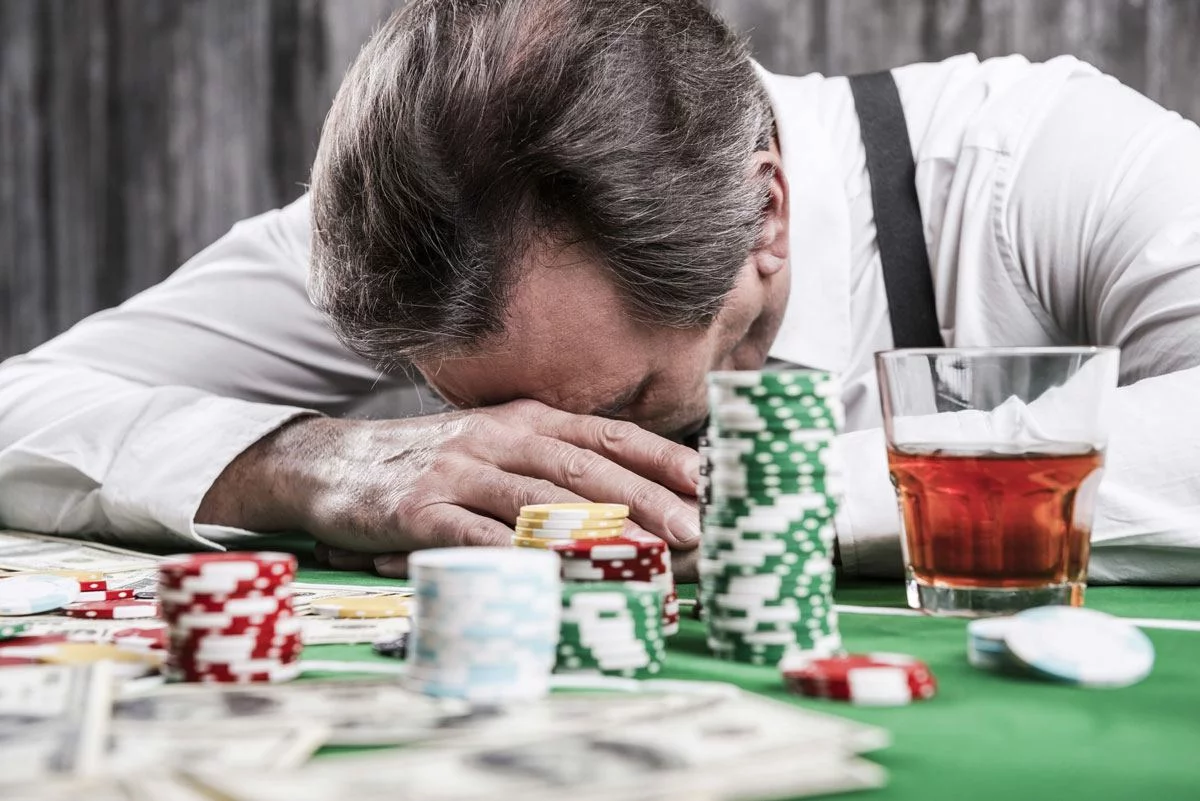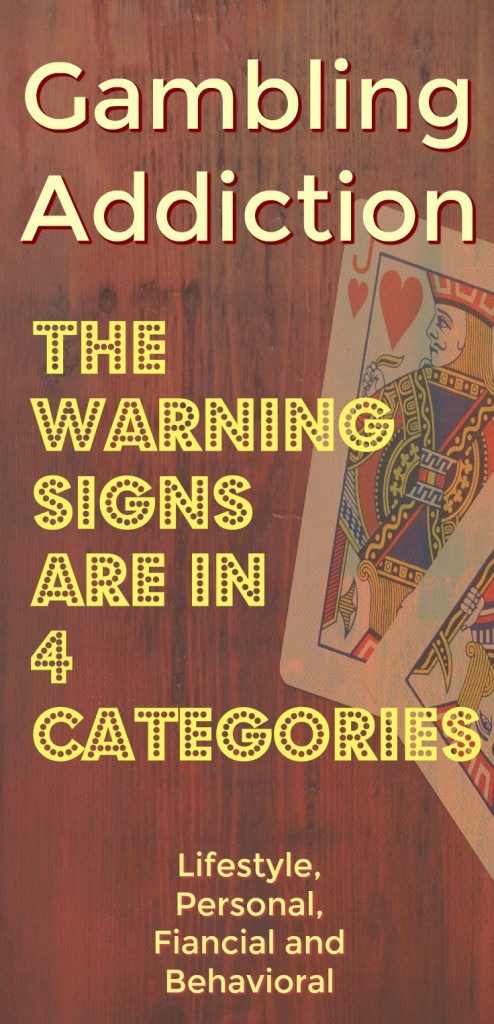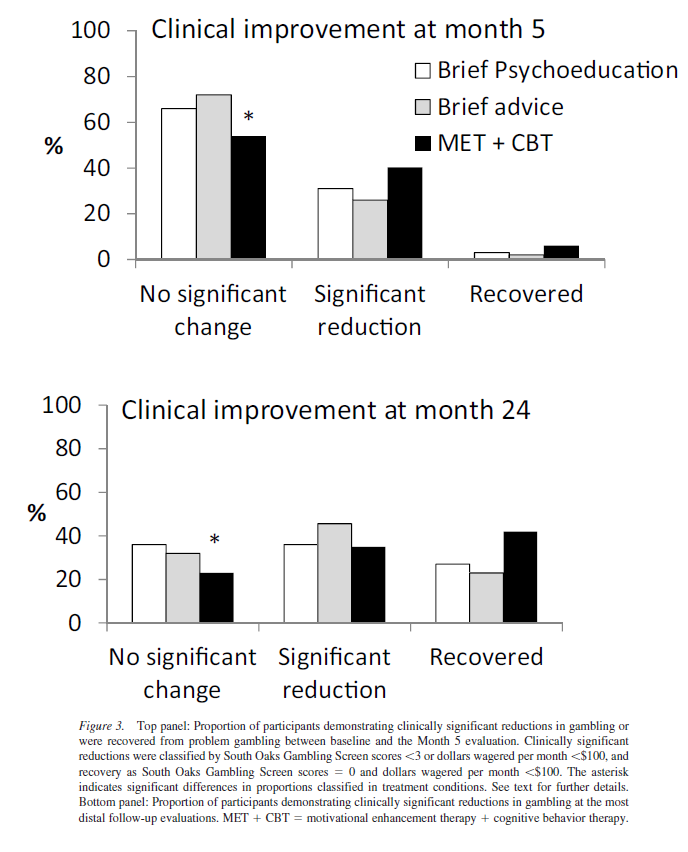Cognitive-behavioural therapy (or CBT) is a type of talk therapy that has shown to be helpful in treating many different conditions, including problem gambling. This Therapist Cognitive Behavioral Therapist (CBT) Manual is designed to assist problem and patho- logical gamblers in addressing negative consequences and issues that have occurred because of gambling.
Medically reviewed:06/22/2018
Last updated: 04/17/2020
Author: Addictions.com Medical Review
Reading Time: 7minutes
What is Gambling Addiction?
Gambling addiction or gambling disorder is defined as persistent and recurring problematic gambling behavior that causes distress and impairs your overall livelihood. Gambling addiction affects roughly 0.2% to 0.3% of the general U.S. population, and tends to affects males more than females, though this gender gap has narrowed in recent years. Gambling disorder is a behavioral addiction that can be effectively treated using a range of cognitive and behavioral therapies.
Table of Contents
The desire to buy scratch tickets, play slot machines, and visit casinos aren’t necessarily signs of gambling addiction. But when the desire to gamble becomes overwhelming to the point you can’t stop thinking about it until you gamble on something, may be a sign you need help. Those who suffer from gambling addiction will continue to gamble despite negative financial, legal, and social consequences.

Gambling disorder is a brain disease that can cause you to do things you wouldn’t normally do if you weren’t suffering from addiction. Behavioral addictions like gambling disorder are often difficult to manage and control without getting professional help. Addiction treatment centers can help you overcome gambling addiction and teach you important skills aimed at helping you repair problems in your life caused by your disorder.
Cbt For Problem Gambling Rules
What are the Signs and Symptoms of Gambling Addiction?
There are no physical health symptoms associated with gambling disorder. Familiarizing yourself with common gambling addiction behaviors can clue you into whether you or a loved one may need professional help.
Chasing after losses is the most common tell-tale sign of gambling disorder. This particular symptom is marked by the urgent need to continue gambling to earn back a loss or series of losses. Individuals diagnosed with gambling disorder may abandon their usual gambling strategies to win back all losses at once and may lie to family, friends, and therapists to hide the severity of their addiction.
The following behaviors are potential signs of gambling addiction:
- Needing to gamble using increasing amounts of money to achieve the desired rush and excitement.
- Feeling restless or irritable when trying to reduce or stop gambling.
- Inability to control, reduce, or quit gambling despite numerous repeated attempts.
- Preoccupation with gambling, such as devising ways to get more gambling money and reliving past gambling experiences.
- Gambling when experiencing feelings of distress, helplessness, guilt, anxiety, and depression.
- Chasing after your losses to get even after losing money gambling.
- Lying to conceal the severity of gambling behaviors, and the addiction.
- Loss of personal relationships, job, and educational pursuits due to gambling.
- Replying on others to provide money to resolve financial situations caused by gambling, such as a threat of eviction from the home.
Those with a mild gambling addiction may exhibit between four and five of these behaviors, while those with a moderately severe gambling addiction may exhibit six to seven of these behaviors. People who suffer from severe gambling addiction will usually exhibit all nine behaviors. Moderate to severe cases of gambling disorder tend to be more common than mild cases.
You might have a gambling problem if:
- You feel compelled to keep gambling until you’ve spent your last dollar. You may keep bidding until you’ve spent everything to win your money back, or you continue increasing bet amounts.
- You hide your gambling from friends or family members. You may sneak off to gamble without telling anyone, or lie about your gambling activities.
- You spend money you don’t have on gambling. You may use money intended for important bills like rent, mortgage, car payments, credit card bills, and other expenses for gambling.
- You steal from others or sell your possessions so you can gamble. You may steal money or belongings from others so you can gamble, or sell or pawn valuable possessions like musical instruments and vehicles to obtain more gambling money.
- You prioritize gambling over obligations related to work, school, family. You may stop going to work or school so you can gamble, or stop buying household necessities so you can use the money for gambling instead.
- You’re experiencing financial hardships due to gambling. You may have lost your home, car, job, and important personal possessions due to gambling.
- You’re facing a range of negative emotions triggered by gambling. Gambling may be a serious problem in your life if it’s triggering depression, anxiety, frustration, agitation, and remorse.
- You want to stop gambling but can’t. You have tried to stop gambling but can’t seem to stop despite your desire to do better and to stop gambling.
Negative Effects of Gambling Addiction
Gambling addiction can produce many more negative effects than just financial hardship. Gambling disorder can affect your physical health, mental health, and social functioning, and lead to the loss of important relationships with friends and loved ones. You may also suffer a decline in work or school performance, and feel more restless and bored with all other areas of life that don’t involve gambling.
Those who suffer from gambling addiction tend to suffer from higher rates of poor general health than those who don’t gamble. Tachycardia and angina are common health problems among those diagnosed with gambling addiction. Many who suffer from gambling disorder also tend to experience distortions in thinking surrounding their addiction, such as superstitions, overconfidence, and a sense of power over the outcome of chance events. Nearly 50% of those receiving treatment for gambling disorder experience suicidal ideation, while an estimated 17% have tried to commit suicide.
The negative effects of problem gambling include:
- Financial problems including high debt, poverty, or bankruptcy
- Domestic violence and child abuse in families
- Suicidal thoughts, attempts, or the act of suicide
- Legal troubles, including arrests for theft or prostitution
- Behavior problems in children of problem gamblers
- Depression, anxiety, and other mental health disorders
- Loss of relationships with friends and family
- A decline in performance at work or school
- Suicide and death
- A risk for drug or alcohol abuse
How Does Gambling Addiction Interact with Addiction?
Alcohol and cocaine are the two most common substances associated with gambling and binge gambling, respectively. Alcohol is legally available in most gambling settings such as bars and casinos and is often rewarded to gamblers for free at many of these establishments. Roughly 44% of people with gambling disorder in the U.S. also suffer from an alcohol use disorder.
Binge gambling is defined as intermittent episodes of uncontrolled gambling after long periods of abstinence. For instance, a person who practices binge gambling may only visit the casino five times per year but gamble non-stop for long periods during their stay. Cocaine use tends to be common among these gamblers since it produces stimulating effects of increased energy, alertness, focus, concentration, and confidence.
Individuals with gambling disorders tend to suffer higher rates of co-occurring alcohol and drug use disorders compared to their peers. Gambling often takes place in environments that enable and encourage alcohol and drug use. Gambling can also trigger mental health conditions like anxiety and depression, which many may self-treat using alcohol and drugs like marijuana, painkillers, and other addictive substances.
How Are Gambling Addiction and Substance Use Treated?
Gambling addiction is commonly treated using cognitive and behavioral therapies that treat the root psychological causes of your addiction. These therapies also help you identify and change negative, unhealthy thoughts and behaviors that may have led to your gambling addiction. Treatments for gambling addiction can be tailored especially for you or your loved one based on the factors surrounding your disorder.
Gambling addiction can also be treated using community reinforcement, group therapy, and 12-step support groups like Gamblers Anonymous. These treatments help you identify your triggers that can lead to gambling and teach you ways to overcome and manage those triggers. For instance, if a stressful day at work usually makes you feel like gambling, you may learn yoga, deep breathing, or other healthy methods that relieve stress without putting your health and well-being at risk.
Gambling Addiction Help
If you or someone you love needs treatment for gambling addiction, it’s important that you use a treatment approach that best suits your recovery needs. Gambling addiction treatment is available in many different settings, including inpatient and outpatient treatment settings.
Inpatient gambling addiction treatment can greatly benefit those who suffer from severe gambling disorder, and who have suffered severe financial, legal, or social problems. Inpatient treatment includes around-the-clock supervision in a hospital-like setting where you can live for the duration of your treatment program. The intense level of therapy, counseling, and supervision provided by inpatient treatment centers can help significantly reduce the risk of relapse while in recovery.
Compulsive gamblers often need support from friends, family members, and peers to help them stop gambling. Gamblers Anonymous groups can provide peer and social support for those in recovery or for those who wish they can stop gambling. These groups can provide a solid, healthy foundation for a successful and long-term recovery from gambling addiction.
Here’s how to help a family member or loved one suffering from a gambling addiction:
Cbt For Problem Gambling Addiction
- Understand the addiction. The first thing you can do to help a loved one who is addicted to gambling is to learn all you can about the addiction. Find a support group that can help you cope with the stress that comes from having a loved one who is addicted to gambling.
- Find support. Support for yourself and for your loved one who is addicted can be very beneficial in helping with a gambling addiction. Many support groups are available throughout communities and in treatment centers. Therapists and counselors can also provide support for gambling addiction.
- Manage money tightly. If your loved one is addicted to gambling and is actively pursuing help, take over managing all financial responsibilities for your loved one. This can help reduce any gambling impulses your loved one may be experiencing throughout their recovery.

Outline and evaluate the cognitive explanation of gambling addiction (4 marks + 6 marks) The cognitive explanation of addiction focuses on the way humans’ process information, viewing addicts as people who have faulty thoughts/judgements. The faulty thinking that surrounds a gambling addiction, according to the cognitive approach, is the belief that we will win, or at least be able to control the odds of winning, for example, a gambling addict, using his/her ‘lucky numbers’ on the lottery gives them some control over the outcome of the gamble.
According to the cognitive model, a gambling addiction may be maintained by irrational or erroneous beliefs. For example, some gamblers may misjudge how much money they have won or lost, or they may over-estimate the extent to which they can predict/influence gambling outcomes. Griffiths held a study looking into these irrational biases, using fruit machine gamblers. His aim was to discover whether regular gamblers thought and behaved differently to non-regular gamblers.

He compared the verbalisations of 30 regular and 30 non-regular gamblers as they played a fruit machine. Griffiths found that regular gamblers believed they were more skilful than they really were, and that they were more likely to make irrational verbalisations during play, for example, regular players may say ‘putting only a quid in bluffs the machine’, or they would treat the machine as if it were a person, giving it emotions: ‘this fruity isn’t in a good mood’. Regular gamblers also explained away their losses be seeing ‘near misses’ as ‘near wins’, i. . they weren’t constantly losing but constantly ‘nearly winning’, something that justified their continuation. The cognitive model also uses heuristics as an explanation of addictive behaviour. Heuristics are used to simplify decisions and justify behaviour, for example, some gamblers will have ‘hindsight bias’, saying after a gambling session that they knew what was going to happen. This makes gamblers feel empowered as it suggests they have some control over their wins/losses. Other gamblers may use flexible attribution; this is where they ttribute any wins to their own skill and any losses to other influences. Others may solely concentrate on how much they won ignoring how much they lost to get it. This is called absolute frequency bias. The theories of the cognitive approach are strengthened by the substantial amount of evidence that supports its general principles, for example, it has been shown that alcoholics, smokers, over-eaters, gamblers and opiate addicts were particularly likely to lapse when they experienced negative emotional states.
Haven’t found the relevant content?Hire a subject expert to help you with Cognitive Explanation of Gambling Addiction (10 Mark)
$35.80 for a 2-page paper
Cbt For Problem Gambling Winnings
Hire verified expertA further strength of the model is that it has initiated implications for treatment, for example, the cognitive approach has made clear that the relapse prevention model must be tailored to each individual addict. However, the model is criticised as there have been claims that irrationality is an erratic predictor of addictive behaviour, irrationality does not appear to have a strong relationship with other observable assets of gambling, such as level of risk taking or reinforcement frequency.
Therefore cause and effect of cognitive bias cannot be established. Cognitive explanations may also be limited to particular addictions, for example, it may be less relevant to chemical addictions like heroin, but is useful and effective explanation for gambling or video game addiction. It is also difficult to establish cause and effect over skill perception and gambling – beliefs about skill in gambling vary across individuals, such beliefs are not necessarily irrational either.
Haven’t found the relevant content?Hire a subject expert to help you with Cognitive Explanation of Gambling Addiction (10 Mark)
$35.80 for a 2-page paper
Cbt For Problem Gambling Sites
Hire verified expertCite this page
Cognitive Explanation of Gambling Addiction (10 Mark). (2017, Mar 17). Retrieved from https://phdessay.com/cognitive-explanation-of-gambling-addiction-10-mark/